
J NOTES
| A glossary of things Japanese, compiled mostly up until about the turn of the century, although the patterns and stray kanji were added in 2025 as part of this HTML conversion. |
| Aji-no-moto | (or Ajinomoto) trade name for MSG and the company name, invented by Professor Kidunae Ikeda in 1909. [umami] | |
| alru-hara | alcohol harassment | |
| ama | women divers | |
| Amekaji | American casual | |
| amigurumi | little crochet figures | |
| annaijo | local information desk | |
| arubaito | part-time work | |
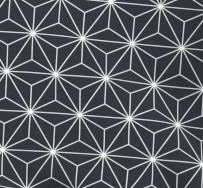 |
asanoha | hemp leaves pattern |
| ateji | kanji used for their sound rather than their meaning | |
| bachi | shamisen/samisen plectrum | |
| Bero-ai, bero | synthetic blue pigment known as Berlin or "Prussian blue" or 'Hiroshige blue' in English | |
| 米国 | beikoku | America |
| benjo | toilet (baka?) | |
| bijin | beautiful woman | |
| bijin-ga | prints of pretty girls | |
| bishie | short for bishōnen | |
| bishōnen | beautiful youth: an aesthetic widely shared in Asia. Young man whose beauty (and sexual appeal) transcends the boundary of sex. In the original Japanese, bishonen applies only to boys under 18. For those older, biseinen (beautiful man) | |
| bokashi | gradation shading of color on ukiyo-e | |
| bonenkai | "forget the year" end-of-year parties, held throughout December, while 'shinnenkai' or "New Year Parties" are held in January. | |
| boryokudan | literally means 'Violence Group', the proper-term for Yakuza | |
| bosozuku zoku |
loud motorcycles after 11PM - "speed tribes" member of a motorcycle tribe |
|
| Burakumin | the symbol used is four fingers held together like the legs of an animal (since they dealt with dead animals) [before the surrender: eta] | |
| bu shugi no kitte | postage stamps with "sad" colors (navy blue, silver and yellow) colors used for New Year's cards when there's been a death in the family | |
| buchō | boss | |
| bukkake | refers to showering a receiver with sperm from one, several or many men | |
| 仏教 | bukkyoh | Buddhism |
| bunbo-ku | school supplies | |
| bunka | kultur | |
| Bunmei Kaika | Transformation of Civilization (during Meiji era) | |
| buraku | the outcast ghetto, hence: burakumin | |
| buton | shiki buton (futon) kake buton (duvet) | |
| chambara | sword-play | |
| chankonabe | fattening stew Sumo wrestlers eat (not sankandon) | |
| chapatsu | tea hair | |
| chikan | gropers, men who fondle women on crowded trains | |
| chindoga | useless inventions (chin - unusual) | |
| chindonya | street performers | |
| chirigami kokan | paper recycling truck | |
| burusera | shops that sell used panties. "Buru" - bloomers, and "sera" - sailor | |
| chokuegambo | the wish that there were more designer-brand shops on a given street | |
| 中国 |
Chugoku | China |
| daihen | getting somebody else to answer for you at roll call | |
| daisho | (large and small - the pair) swords | |
| dango | round mochi, skewered then barbecued (and not sweet). Also, price-fixing | |
| dekasegi | reverse migration, back to Japan (from Peru) | |
| deniru | "to hang out in Denny's" - Family restaurants, found not only along suburban highways but also in the central city: Denny's (Deniizu), Jonathan's (Jonasan), Royal Host (Roiyaru Hosuto) and Skylark (Sukairaku) | |
| den-wa | telephone (electric talk) keitai denwa - mobile phone |
|
| doboku | construction | |
| dojin, dojinshi | "amateur" or copycat comics - manga produced by manga and anime fans, published in 'zines | |
| Domo-kun | small brown open-mouthed monster, mascot of NHK's BS2 (a satellite channel) | |
| Don't Pelorian | don't be normal when you're supposed to be abnormal | |
| dotaku | bronze, bell-like objects from antiquity, usage unknown | |
| Edo no hana | flowers of Edo: fires | |
| Edokko | Edo citizens | |
| eikaiwa | English conversation (schools, the big four: |
|
| enjo kosai | "assisted dating" usually w/ high school girls | |
| enka | sentimental ballads | |
| enryo | polite restraint | |
| eta | outcast (archaic Enow, burakumin) | |
| fukujoshi | to die during sex - literally, to die atop a belly | |
| fumi-e | stepping on a metal image of Christ or Mary | |
| furikake | condiment sprinkled on rice - typically consists of a mixture of sesame seeds, chopped seaweed, sugar, salt, and MSG. Other flavorful ingredients such as dried skipjack tuna shavings, salmon etc. are often added to the mix. | |
| furita | people who work part-time and without job security (also, freeta: free part-timer) |
|
| furoshiki | cloth wrapper | |
| fusuma | opaque shoji | |
| futōkou tōkōkyohi | school refusal (absent more'n three days) | |
| futsuu | normal, a fact of life | |
| gachapon | capsule toys from vending machines | |
| gaikoku-jin (gaijin) | outside people/person
|
|
| gaika | foreign currency | |
| gairaigo | loan or borrowed words, almost exclusively written in katakana | |
| gaisha | foreign cars | |
| gaman | virtue of endurance without complaint - to suffer quietly, even in the worst of circumstances | |
| ganguro | literally, blackface - darkened skin via makeup or tanning salon | |
| 元気 | genki | healthy, energetic, optimistic, perky, bouncy, horny, happy, cheerful, high-spirited, filled with life |
| giri | demands of duty, or of traditional family - what society expects, debt of gratitude | |
| girichoko | candy women give men (not their spouses/SOs) on Valentine's Day | |
| gohei or oshide | the zig-zag paper streamers at shrines | |
| Gojira | (stress on "go") - a combination of King Kong ("ko") and Kujira (whale) | |
| gomi | rubbish | |
| habu | snake | |
| hachimaki | headband | |
| hage | bald | |
| hamaya | Shogatsu (New year's) good luck arrow | |
| hanabi | fireworks | |
| hanagumori | hana = flower. kumori (or gumori) = cloudy weather. This is desirable - when cloudy, you get the subtle pink cherry blossom, white sky combination. The pink in front of a blue sky contrasts too sharply. | |
| han-cho | group leader (honcho) | |
| hanshi | archaic writing paper, 24cm square | |
| hassha | short, ear-pleasing jingles known also as departure or train melodies | |
| hatsu-yuki | first snowfall of winter | |
| 早い | hayai | early, fast |
| henro | pilgrim | |
| hentai | erotic anime (literally, it means perversion) | |
| hibakusha | atomic bomb victims | |
| hibutsu | 'secret buddha' - important, hidden Bhudda statue | |
| hikifuda | advertising prints | |
| hikikomori | social withdrawal - psychopathic otaku who have withdrawn from society | |
| himanji | fat children | |
| hinin | criminal, beggar or social outcast | |
| hinomaru | the flag of Japan (literally, sun disc) | |
| hitomaki | sewing kits like I inspected at Hirano-ya 8-7-4 Ginza | |
| hojo jitsu | Medieval samurai martial art of tying up captured enemies | |
| honne | real feelings or intent - what you actually believe, but usually never say (cf. tatemae) | |
| ichigen | 'first look' - a customer without an introduction | |
| ijimie | teasing, bullying, especially of the smart by the stupid | |
| ijime-lareko | the targets of the bullying | |
| iki | chic, stylish (vs. yabo) | |
| inaka | countryside | |
| inari | the Shinto god of rice and sake. Foxes are his messengers, and their favorite food is said to be balls of rice in pockets of sweetened fried tofu | |
| irori | open hearth | |
| ishiyaki-imoya | hot-potato seller | |
| iyashi | healing and relaxing goods | |
| Japonisme | coined in 1872 by Felix-Hilaire Buhot | |
| jido-hanbaiki | vending machines | |
| Jinrai Butai | the divine thunderbolt (Kamikaze) | |
| jishinban | fire watcher (who calls out "Hi no yo-jin" (Beware of fires)) | |
| jishan | earthquake, self-confidence | |
| JOAK | the first radio station | |
| jubako | stacking lunchbox, bento or for osechi (New Year's) | |
| juban | underwear (from the Portugese jibao) | |
| junishi | the twelve signs of the zodiac | |
| kaeru | frog, and the verb to return - hence, one travels with a froggy | |
| kago | palanquin or sedan-chair | |
| kaishaku | the 'second' in seppuku | |
| kaiju | "giant monster" | |
| kaiso | out of service | |
| kakimochi | baked rice cracker vs. senbei: rice cracker | |
| Kami no Yo | Age of the Gods | |
| kamishibai | old, traditional story-telling (with the still images in a frame) | |
| kamuro | young girl apprenticed to a brothel | |
| kani kama | surimi krab | |
| Kasei, Kaseijin | Mars, Martian | |
| karakuri | mechanical device to tease, trick, or take a person by surprise | |
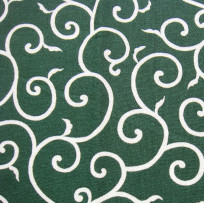
|
karakusa(moyo) | vines pattern |
| karisuma tenin | charismatic salesgirls | |
| karoshi | death by overwork | |
| katori-senkō | mosquito-incense (katori-buta - the pig it's burned inside) | |
| kazan | volcano, "fire-mountain" | |
| keigo | Japanese honorific or self-effacing speech, three types: sonkeigo, kenjōgo and teineigo | |
| keiretsu | corporate groupings which followed the war, amid the dissolution of zaibatsu family-controlled monopolies | |
| keitai | "portables" - tiny cellular phones | |
| kenchinjiru | a stew containing burdock, carrots, daikon radish, pork, tofu, and konnyaku | |
| 気 | ki | vital energy |
| kidōtai | riot police | |
| kigurumi | masked figures, like Mickey at Disneyland - not cosplay | |
| kikoku shijo | children of overseas businessmen who've returned to Japan | |
| kiku | chrysanthemum | |
| kimigayo | the Japanese national anthem | |
| kimoi | gross! | |
| kinpatsu | golden-haired | |
| kiritsu | Achtung! | |
| kisama | you (bastard!) | |
| kobito | lover | |
| kodokusi | dying alone, dying because one is alone | |
| kogaru, kogal, kogyaru | (high school?) call girl (ko - little, garu - girl), enjo-kosai - teen prostitution? That look, anyway. See also: Assisted Dating | |
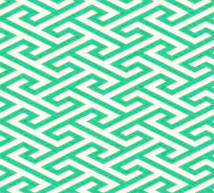
|
kojitsunagi | interlocking "I's" pattern |
| 心 | kokoro | soul, heart |
| koku | amount of rice needed to feed one man for one year | |
| kokumin | the Japanese people, the word used in their Constitution ("all people are equal") | |
| kokutai | body politic, national essence (a pre-war concept) | |
| konnyaku | devil's-tongue jelly | |
| korokke | fried mashed potatoes mixed with meat or other ingredients | |
| koshikake | the little stool in the public bath | |
| koyo | crimson leaves | |
| kuichi | Jewish | |
| kuma | bear | |
| kumade | decorative lucky fan, for "raking in the money" (uchiwa - oval hand-fan, sensu - folding fan) | |
| kuni | home, where you come from | |
| kurambo | Negro | |
| kuroko | black-clad Kabuki and Bunraku attendants, supposedly invisible to audience | |
| kusari-doi | rain chain, downspout alternative | |
| kusudama | spherical origami (kusui: medicine, tama: ball) | |
| kushimono kushiyaki |
dinner on a stick kebabs |
|
| kyo-no-ranchi | today's lunch special | |
| mairu-tomo | mail friend | |
| maki guso | roughly translates as "curlicue poo" - presented in Japan as a prettified swirl resembling soft ice cream | |
| 万円 | man en | 10,000 yen |
| maneki-neko | beckoning cat - cats with the right paw raised are beckoning in money or good fortune and cats with the left paw raised are beckoning in customers. Most Maneki-neko are white, but if you see a black one, it is warding off evil, and the even rarer red ones are to prevent sickness. | |
| manji | backwards swastika, Buddhist temple symbol (can mean good fortune) | |
| mankitsu | manga kissaten = manga cafes (some offer showers and even allow overnight sleeping, on the floor?) | |
| marumado | also called yoshinomado - circular window, or a circular window with a flat bottom edge. If the round window is over 1.5m in diameter, it's called ōmarumado. | |
| mawashi | sumo wrestler's loincloth | |
| mazui | inappropriate, nasty-tasting | |
| meibutsu | village's speciallty | |
| meiwaku | group shame, or just inconvenience | |
| meiwaku mail | mobile phone spam | |
| mikoroshi | stand idly by while another dies | |
| mizuage | deflowering | |
| mogaki | one who preys on men sleeping outdoors (aokansha) | |
| momiji | Japanese maple tree | |
| Mommo-no Sekku | Girls' Festival (March 3) | |
| mono no aware | essential sadness of life | |
| mō | 100 mo = 1 sen | |
| Mutsuhito | what Meiji (which means enlightened rule) was called before his death | |
| namasera | variation of burusera. "Nama" - fresh, panties worn by the girl who then removes them and hands them over directly at the point of sale | |
| nampa | attempt at 'picking up' a girl (or, the wolf) | |
| natsukashii | pleasurable / sad nostalgia | |
| nengo | era name (like Showa) | |
| nihon-jin | the Japanese people
|
|
| Nikkei | Nippon Keizai Shinbun | |
| nikuman | meat-filled steamed
bun
|
|
| ninjo | pull of human emotions or modern ways - human feeling towards | |
| niito | NEET: Not in Education, Employment or Training. Also, freeta and putaro | |
| nojuku | people sleeping in the open air (or under blue plastic?) or also aokan, sleeping out in the open, hence aokansha, person who sleeps in the streets) | |
| nomiya | classic pub | |
| nyan nyan | a widely used term for sexual activity | |
| nyotaimori | woman-body-helping, plateful - eating sushi off a naked lady | |
| Nyu-Sha-Shika | Entering the Company ceremony (April 1) | |
| obasan | middle-aged woman | |
| お茶 | ocha, not kocha (English) or the roasted brown hōjicha |
gyokuro (best quality green tea), then comes
|
| ojisan | middle aged man | |
| okama | gay males | |
| okami-san | proprietress of a ryokan | |
| okoge | the crust of rice that sticks to the side of the rice pot (also, fruit flies or fag hags - women who like gay men) | |
| okusan | person of the interior: wife | |
| omamori | good luck charms from shrine or temple | |
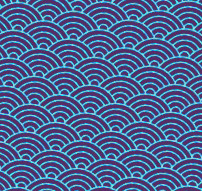
|
ominami or seigaiha | waves pattern |
| omiyage | souvenirs | |
| oneesan | older sister, young woman | |
| oni | a small malicious horned demon | |
| oreiboko | a former apprentice giving his master a man/year, gratis, after gaining his journeymanship | |
| ossan | oyaji | |
| Oshichi | was burned at the stake for burning down the house | |
| oyaji | dad (juvenile corruption of oyachichi), middle-aged, unfashionable, noisy, self-centered, greedy, soul-less drone | |
| oyabun | boss, leader | |
| pachi-puro | professional pachinko player | |
| pachi-suro | pachinko slots | |
| panchira | showing the panties | |
| pittari | on the dot, "bang on the nose" | |
| puri kura | (print club) little photo stickers | |
| putaro | an unemployed loafer who is between jobs | |
| rikishi | sumo wrestler | |
| rin | 1000 rin = 1 yen | |
| ronin | high-school graduates who take a year off in order to study solo in preparation for university exam | |
| ronin mawashi | pen spinning | |
| rori-kon | "Lolita complex" (a loose transliteration) | |
| rusu-sokusu | loose socks (or ru~zu sokkusa) | |
| ryotei | exclusive restaurant | |
| sabi | a sense of the impermanence of things | |
| sabisu | service (no charge) | |
| sakariba | district of bars & nightlife clubs | |
| sakenosakana | like tapas | |
| sankin kotai | samurai back-n-forth 'tween Edo and the home office | |
| sashimono | flag attached to the back of the armor to facilitate recognition in battle | |
| "satee wan" | 31 = Baskin-Robbins | |
| Satsuma | now known as Kagoshima | |
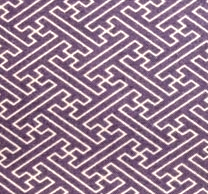
|
sayagata or "keyfret" | eternal knot with swastika/Buddhist cross (manji) pattern (aka: manji tsunagi) |
| seijin no hi seijin-shiki |
coming of age day (traditionally January 15, now: Happy Monday) coming of age ceremony |
|
| 酒 | seishu | sake
|
| seka haru | sexual harassement | |
| semba tsuru | a thousand cranes, ren-zuru connecting cranes | |
| semi | cicada | |
| sempai/ko-hai | senior/junior | |
| senga | a highly refined and complex form of the traditional Japanese cut-paper art called kirigami | |
| Sengo Kiseki | postwar miracle | |
| sensu | folding paper fan | |
| sen zuri | a thousand rubs (manzuri: ten thousand rubs) | |
| settai | donation | |
| shabu | speed (Amphetamines) | |
| shibui / dasai | cool / uncool, ugly | |
| Shichifukujin | the seven lucky gods | |
| shichigosan | 3 5 7 coming of age ceremony | |
| shigoto | work | |
| Shin Hanga | 'new prints' (like the 20th century work of Hasui and Eijiro Kobayashi) | |
| shin hatsubai | newly available | |
| shinju | double suicide | |
| Shishi-odoshi, or so~zu | the bamboo-tube-water-knocking rig (the first name means animal- or deer-scarer) | |
| shitaki mania | regular panty mania, not the weird kind (?) | |
| shiteiseki | reserved tickets | |
| shobijin | small beauties (The Peanuts in "Mothra") | |
| shogakusei | no longer cute | |
| shogo | girls' manga | |
| shokuji | mealtime | |
| shonen (boys) and shojo (girls) | two types of anime | |
| shokudō | cafeteria | |
| Shosoin | Imperial Treasury (in Nara) | |
| shukubo | temple lodging | |
| shun-ga | "spring pictures" - ukiyo-e porno | |
| Sofusha | right-wing political group known mostly for parading with nationalist slogans blasting through loudspeakers mounted on ominous-looking black buses. Sofusha and some other right-wing groups have close ties to the yakuza | |
| soji | cleaning | |
| soto | outside the family or group (cf. uchi) | |
| sudare | lined-up bamboo hanging down: bamboo matchstick blinds | |
| sugidama | cedar fronds ball | |
| sugoi | cool, awesome! | |
| (denki) suihanki | (electric) rice cooker | |
| suiseki | the art of stones found in rivers, for viewing | |
| sukatu no naka | inside the skirt | |
| sukosi | skosh | |
| sumi | charcoal | |
| tachi-nomi | places inside or next to liquor stores, open afternoons or early evenings | |
| taibatsu | corporal punishment | |
| taima | hemp | |
| 高い | takai | high, expensive |
| tamaranai | an uncontrollable attraction one feels (towards kogal) | |
| Tango-no Sekku | Boys Festival (May 5) | |
| tankuoban | paperback manga collections | |
| tanuki | raccoon-dog | |
| tanzaku | ribbon/scroll on certain of the hanafuda cards | |
| ta-ray | Tsukiji vehicle | |
| tategaki | top-to-bottom, then right-to-left vs. yokogaki: left-to-right, then top-to-bottom | |
| tatemae | "building a front" - not lying, really, just putting up a polite front, to avoid hurt feelings - flattery, officially stated position (cf. honne) | |
| teishoku | set meal | |
| tenno heika | His Majesty the Emperor | |
| tenugui | traditional hand towels, use as headbands, etc. | |
| tokoro ga | the matter at hand | |
| tokusatsu | special photography (Japanese science fiction television and movies) | |
| tomoe | the comma in kamon - based on archer's leather arm protector | |
| tomarimasu | overnight (at a love hotel) | |
| torii | "bird rest" - wooden archway found outside Shinto shrines, and originally a perch for birds dedicated to the gods | |
| tsukeru | being pickled (in a bath) | |
| tsumayōji | toothpick | |
| tsukuri | sashimi in Kanto | |
| tsukisoi | sub-professional nurse | |
| tsuyu | month-long "rainy season" | |
| tsuyukusa | a fugitive blue pigment derived from the petals of the dayflower | |
| uchi | inside, "on the bus" (cf. soto) | |
| ukiyo-e | floating world pictures | |
| umami | the 5th taste: a specific kind of salty, tangy taste, not in foreign cooking (like soy) - savory, deliciousness, MSG | |
| unchi unko |
poop shit (or maybe, a turd) |
|
| uyoku | right wing groups, with their gaisensha (trucks equipped with loudspeakers) The best estimates are that there are more than 100,000 members of far-right groups in Japan, belonging to almost 1,000 groups throughout the country, 800 of which are affiliated through an organisation called the Zen Nihon Aikokusha Dantai Kaigi (All-Japan Conference of Patriotic Associations) |
|
| 和 | wa | harmony |
| wabi | rustic simplicity (which can be boring), or how a slight imperfection merely accentuates the fundamental perfection of a thing | |
| Wabisabi wabi & sabi |
the beauty of poverty together they signify the beauty of the ephemeral and the fleeting; the aesthetic of decay, asymetrical detail and natural color, and an appreciation of the incomplete, the impermanent, the imperfect. |
|
| wagamama | selfishness, egoism | |
| wagara | Japanese patterns | |
| wangiri | when people call and let the phone ring once and leave their caller ID on your phone to get you to call them back. It has become a type of spam | |
| warikan | going Dutch | |

|
yabane or yagasuri | arrowfeathers pattern |
| yabo | unrefined, boorish, vulgar | |
| yagai | outside, ie public sex, public urination | |
| yakiimo | sweet potato(also satsumaimo) | |
| yakimono | grilled dishes | |
| yakinohara | burnt plains, atomic wasteland | |
| yakudoshi | an inauspicious year (ie, streak of bad luck) | |
| yakuza | means 'Eight-Nine-Three' and comes from a Japanese form of gambling known as Oicho-Kabu, which is similar to Blackjack. In this game, the object is to get 19 points, so the score of eight plus nine plus three (20) is worthless and came to be associated with the Yakuza who were considered to be worthless to society. | |
| yamabushi | mystic mountain man, warrior-monk (literally "sleeping in the mountains") | |
| yamakake | mountain potato | |
| yamamba | mountain witches - girls with bleached (white?) hair and white makeup, usually ganguro (Gan: face and Kuro: black) and wearing atsukutsu (the big-soled shoes) | |
| Yamato | "Land of Great Harmony" - traditional name for Japan | |
| Yamato nadeshiko | Japanese ideal woman | |
| yanqui | young bucks wearing nikka-bokka pants | |
| yaso-e | "gather together pictures" - large pictures composed of many small pictures | |
| yasui | cheap | |
| yobai | night crawling | |
| yokozuna | grand sumo champion | |
| yorikiri | stepping outside the sumo ring | |
| Yoshida Kogyo Kabushiki-gaisha | YKK slide fasteners - HQ in Kurobe City | |
| >ゆ | yu | hot water labels in the sento: atatakai (hot) and nurui (tepid) |
| 雪 | yuki | snow |
| yutori | slack; to take it easy. (Having a surplus of something, time or money) | |
| zaibatsu | the great family-controlled banking and industrial combines of modern Japan. The leading zaibatsu are Mitsui, Mitsubishi, and Sumitomo. (This word may be archaic, modern term is keirestsu) | |
| zakka | miscellaneous goods | |
| zanryu koji | Japanese children left in China after the war who returned to Japan decades later only to find themselves unable to fit in | |
| zaru | monkey
|
|
| zashiki | tatami room | |
| zentai | woman dressed in a tightly fitted, opaque, body sock-y (Latex, leather, cloth, etc) that covers every inch of her skin |